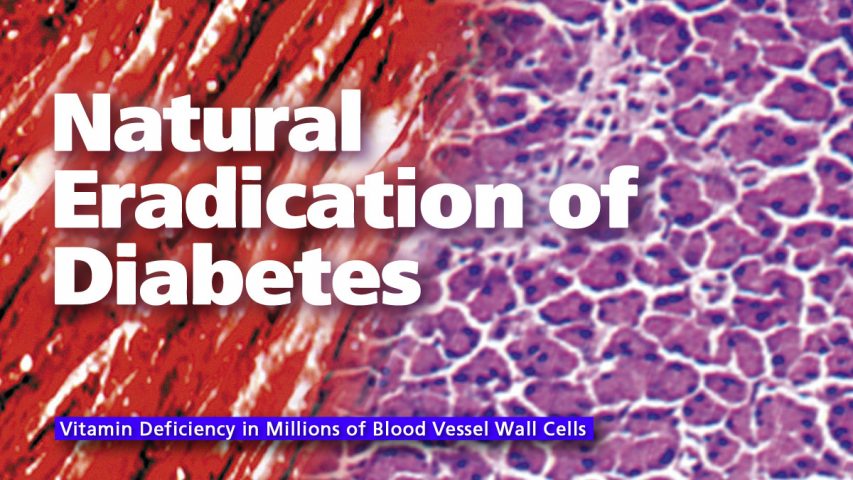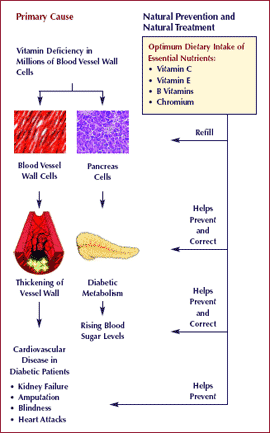- Have any questions? Contact us!
- info@dr-rath-foundation.org

Natural Eradication of Cardiovascular Disease
June 26, 2017
Natural Eradication of Heart Failure
June 26, 2017Natural Eradication of Diabetes

Worldwide, more than 422 million people suffer from diabetes. Diabetic disorders have a genetic background and are divided into two types: juvenile and adult. Juvenile diabetes is generally caused by a genetic defect that leads to an insufficient production of insulin in the body and requires regular insulin injections to control blood sugar levels. The majority of diabetic patients, however, develop this disease as adults. Adult forms of diabetes also have a genetic background. However, the causes that trigger the outbreak of the disease in these patients at any stage in their adult lives have been unknown. It is, therefore, not surprising that diabetes is yet another disease that is still growing on a global scale.
 Conventional medicine is confined to treating the symptoms of adult diabetes by lowering elevated blood levels of sugar. However, cardiovascular disease and other diabetic complications occur even in those patients with controlled blood sugar levels. Thus, lowering blood sugar levels is a necessary, but incomplete, treatment of diabetic disorders.
Conventional medicine is confined to treating the symptoms of adult diabetes by lowering elevated blood levels of sugar. However, cardiovascular disease and other diabetic complications occur even in those patients with controlled blood sugar levels. Thus, lowering blood sugar levels is a necessary, but incomplete, treatment of diabetic disorders.
Modern Cellular Medicine now provides a breakthrough in our understanding of the causes, prevention and adjunct treatment of adult diabetes. The primary cause of adult onset diabetes is a long-term deficiency of certain vitamins and other essential nutrients in the millions of cells in the pancreas (the organ that produces insulin), the liver and the blood vessel walls, as well as other organs.
On the basis of an inherited diabetic disorder, deficiencies of vitamins and other essential nutrients can trigger a diabetic metabolism and the onset of adult diabetes. Conversely, the optimum intake of vitamins and other ingredients in Dr. Rath’s Cellular Health recommendations can help prevent the onset of adult diabetes and help correct existing diabetic conditions and its complications.
Scientific research and clinical studies have documented the particular value of vitamin C, vitamin E, certain B vitamins, chromium and other essential nutrients in helping to normalize a diabetic metabolism and prevent cardiovascular disease.
Diabetes is a particularly malicious metabolic disorder. Circulatory problems and clogging can occur in virtually any part of the 60,000-mile-long blood vessel pipeline.
How Diabetic Cardiovascular Disease Develops
The key to understanding cardiovascular disease in diabetics is understanding the similarity in the molecular structure of vitamin C and sugar (glucose) molecules. This similarity leads to metabolic confusion with severe consequences:
The cells of our blood vessel walls contain tiny biological pumps specialized for pumping sugar and — at the same time — vitamin C molecules from the bloodstream into the blood vessel wall. In a healthy person, these pumps transport an optimum amount of sugar and vitamin C molecules into the blood vessel wall, enabling normal function of the wall and, thus, preventing cardiovascular disease.
Because of the high sugar concentration in the blood, the sugar and vitamin C pumps are overloaded with sugar molecules. This leads to an overload of sugar and, at the same time, to a deficiency of vitamin C inside the blood vessel walls. The consequence of these mechanisms is a thickening of the walls throughout the blood vessel pipeline, which puts organs at risk for infarctions.
The optimum daily intake of selected cellular nutrients — in particular vitamin C — helps to restore the balance between vitamin C and sugar metabolism inside the cells of the pancreas, blood vessel walls and other organs.



